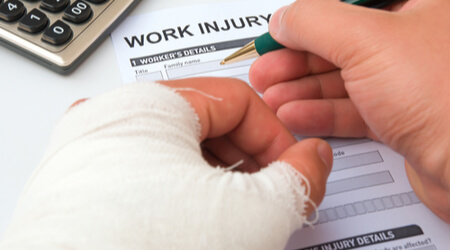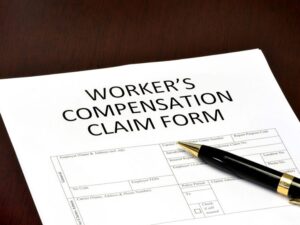
Independent Contractors and Workers’ Compensation
When workers suffer injuries on the job, they are usually entitled under South Carolina law to seek workers’ compensation benefits. These benefits can provide financial resources to help with medical expenses and to cover lost wages partially. Although independent contractors are typically considered ineligible for workers’ compensation, under certain circumstances, they may be able to access workers’ comp benefits after an on-the-job injury.
If you were injured while working as an independent contractor, don’t make any assumptions about your legal rights. The workers’ compensation attorneys of Joye Law Firm can help you understand your options and fight for any benefits you deserve. For more than 50 years, our attorneys have helped injured workers pursue personal and financial recovery after serious workplace accidents. Both of our partners have been named as Super Lawyers, and our legal team has a long track record that includes multiple six- and seven-figure recoveries obtained on behalf of injured workers.
Speak to one of our knowledgeable attorneys now to learn more about your eligibility for workers’ comp as an independent contractor in South Carolina. Contact our firm at 888-324-3100 for a free case review.
What Is Considered an Independent Contractor?
An independent contractor is someone who works for themselves, rather than being hired as an employee by the company the independent contractor works for. Typically, an independent contractor performs a service for the employer that hires them pursuant to a written or oral contract. The methods used by the independent contractor to provide that service is free from the control and direction of the employer.
In South Carolina, a worker may qualify as an independent contractor if they:
- Have independent employment
- Contract to perform work for an employer according to the contractor’s own methods
- Are not subject to the control of the employer, except as to the results of the contractor’s work
A worker does not qualify as an independent contractor simply because he or she may have been labeled as such in a written or oral agreement. Instead, South Carolina law uses a multi-factor test to determine whether a worker may be appropriately classified as an independent contractor.
Differences Between Employees and Independent Contractors
Employees and independent contractors have a few key differences under South Carolina law, including:
- Employees are typically dependent on their employer for income, while independent contractors usually have multiple clients and sources of income.
- Employees receive a regular wage or salary, whereas independent contractors are paid on a flat-fee or invoice basis.
- Employees may be told where and when to work, while independent contractors may only be subject to a contractual deadline to deliver finished work.
- Employees are usually provided with the tools of their jobs, such as uniforms or equipment, whereas independent contractors usually furnish their own equipment.
- Employees may be disciplined and fired by employers, whereas independent contractors are only subject to termination of their agreement with the employer.
Do Independent Contractors Have the Right to Workers’ Compensation Benefits in SC?
Typically, an independent contractor is not entitled to workers’ compensation benefits from the company that hires them to perform work or services. However, an individual working as an independent contractor may be employed by another company that has contracted with the employer to perform services. The individual independent contractor may be entitled to seek workers’ comp benefits for injuries suffered while rendering services for a client.
In addition, a worker who is nominally classified as an independent contractor may be entitled to workers’ compensation benefits if it is determined that the worker has been misclassified and, under South Carolina law, should be properly classified as an employee.
South Carolina uses the “right to control” test to determine when a worker has been properly classified as an independent contractor. The test does not look at whether the employer actually controls the worker’s methods of work, but rather only whether the employer has the authority or right to direct the particular methods by which a worker completes tasks.
Specifically, state agencies and courts will look at four factors under the “right to control” test:
- Evidence of the right to control the manner or method of work, such as contractual provisions or course of dealing between the worker and employer.
- Whether the employer furnishes the means for the worker to do the job, such as providing equipment, uniforms, work facilities, training, etc.
- Whether the employer holds the right to discipline and fire the worker.
- How the employer pays the worker. Is the worker paid on a flat-fee or on an invoice basis, or is the worker paid a regular (e.g., weekly, bi-weekly) wage?
If a worker does not meet the test to be classified as an independent contractor, he or she is automatically considered an employee.
When Do Independent Contractors Need Workers’ Comp?
An independent contractor in South Carolina is typically not required to purchase worker’s compensation insurance for themselves. However, independent contractors may be required to have a workers’ comp insurance policy if they have four or more employees of their own.
An independent contractor may also consider purchasing workers’ compensation insurance if required to do so under the terms of a contract with an employer. (The employer may wish to guard against an independent contractor making a claim against the employer’s workers’ compensation insurance.)
Or the independent contractor may consider purchasing workers’ comp insurance to ensure that he or she will have medical coverage in case of an injury on the job, in addition to partial coverage for lost income. (Some health insurance policies may deny coverage for work-related injuries.)
Common Independent Contractor Injuries
Examples of work injuries that independent contractors may suffer on the job include:
- Head injuries
- Whiplash injuries
- Traumatic brain injuries
- Fractured bones
- Dislocated joints
- Lacerations
- Repetitive stress injuries
- Soft-tissue injuries, including ligament/tendon/muscle tears and sprains
- Neck and back injuries
- Disc herniations and ruptures
- Crush injuries
- Amputations
- Injuries from assault and battery
- Burns
- Electrocution injuries
- Internal organ injuries and internal bleeding
- Exposure to disease or toxic substances
What to Do If You’ve Been Hurt on the Job as an Independent Contractor
If you’ve been injured on the job as an independent contractor, you can take actions to help protect your legal rights:
- Report your injury to the company you are working for. You may have been improperly classified as an independent contractor, but if you fail to timely notify an employer of a workplace injury, you may lose eligibility for workers’ compensation benefits.
- If possible, take photographs or video of the accident scene, including what may have caused your injury, as well as any visible injuries you may have suffered. Also get the names and contact information for any witnesses to your accident.
- Get examined by a doctor as soon as possible. If you wait to have your injuries diagnosed, it can make it harder to pursue compensation later. The employer may argue your injuries were not caused on the job.
- Keep copies of your bills, invoices, receipts, pay stubs and income statements, and other documents to calculate your financial losses from your injuries.
- Speak to a workers’ comp attorney as soon as possible to discuss your legal options. You might be eligible to file a claim for workers’ compensation, or you may have other avenues to seek financial compensation for your expenses and losses.
How a Workers’ Comp Attorney Can Help
If you’re injured while working as an independent contractor, a workers’ comp attorney from Joye Law Firm can help you pursue your options by:
- Reviewing the circumstances of your employment to determine whether you’ve been properly classified as an independent contractor
- Filing a workers’ compensation claim if you don’t meet the test for an independent contractor and may be entitled to benefits from your employer
- Advocating on your behalf in workers’ compensation hearings to demand the full benefits you deserve under South Carolina law
- Exploring alternative legal options for recovering compensation for your injuries and losses depending on the circumstances of your injury, such as bringing a premises liability claim, product liability claim, or motor vehicle accident claim
Don’t wait to learn about your legal rights if you suffered an injury while on the job as an independent contractor. Contact Joye Law Firm online today or call us at 888-324-3100 for a free, no-obligation consultation with a South Carolina workers’ compensation attorney.
Our law firm has four conveniently located offices in Charleston, Myrtle Beach, Columbia and Clinton to injured workers throughout South Carolina.



























